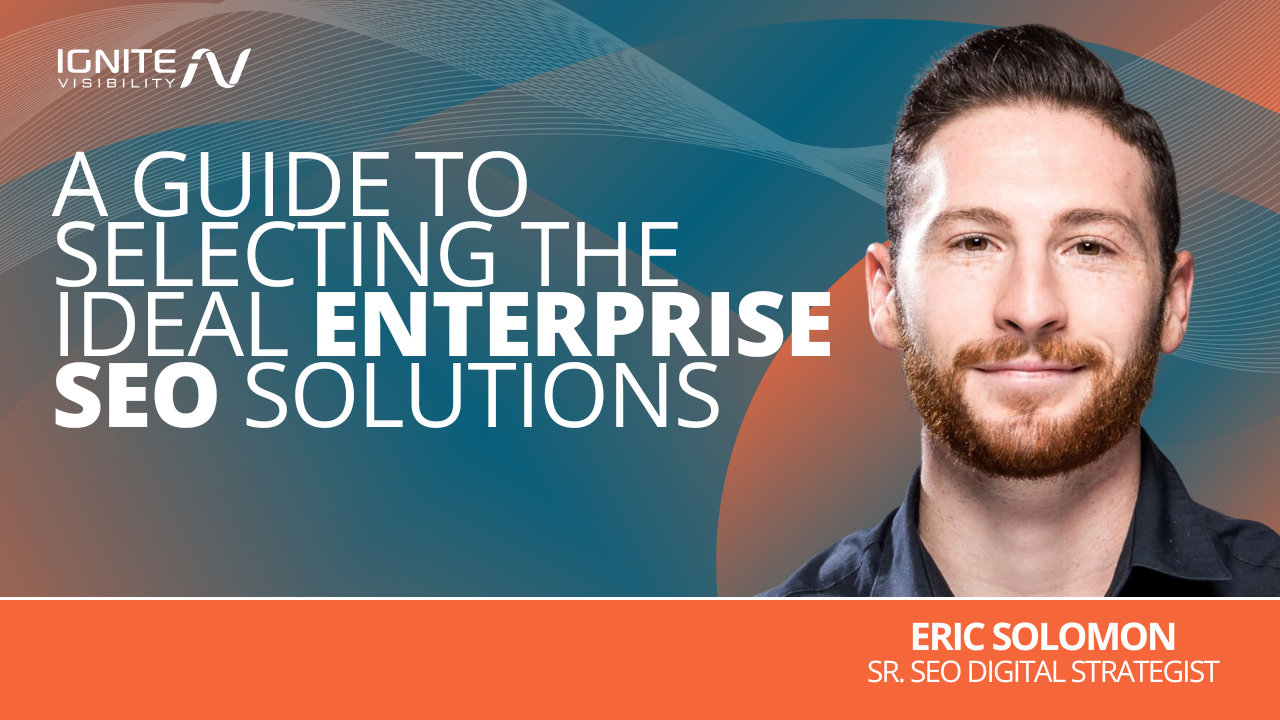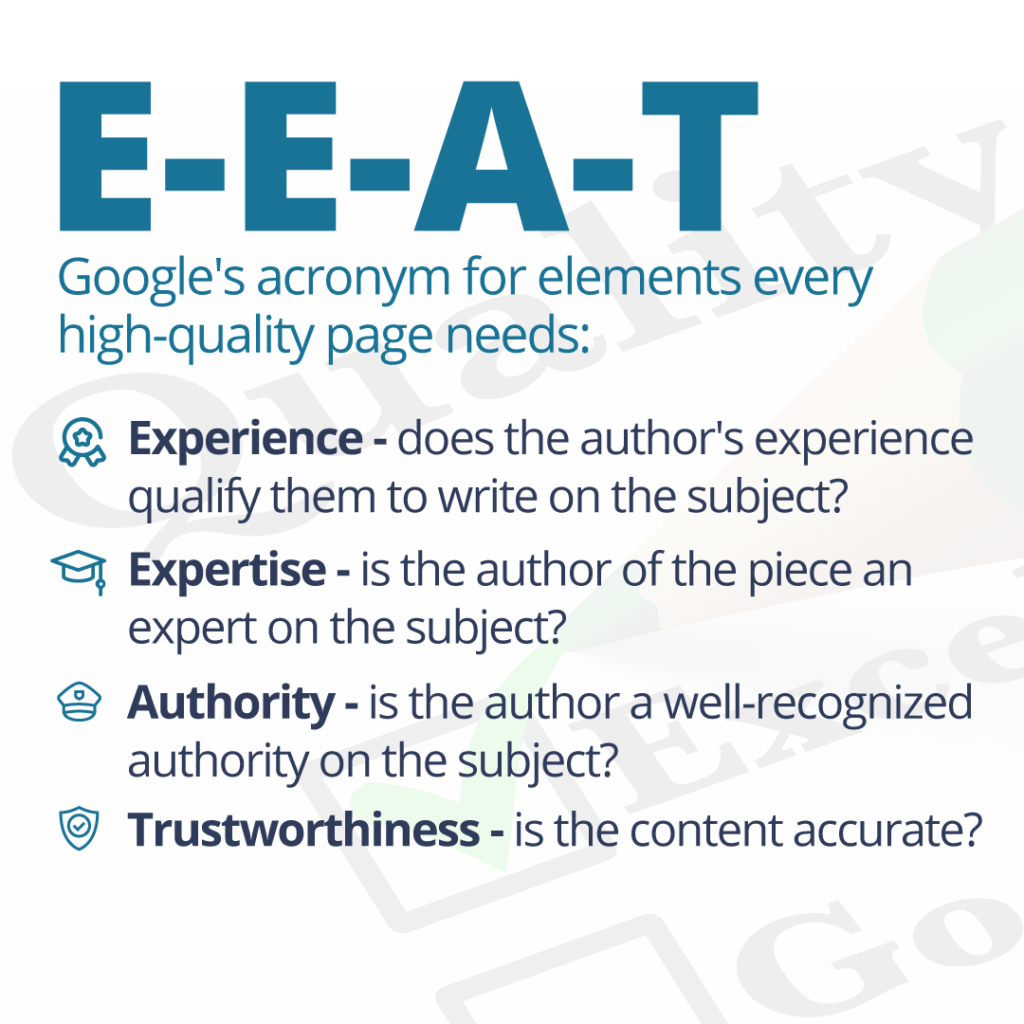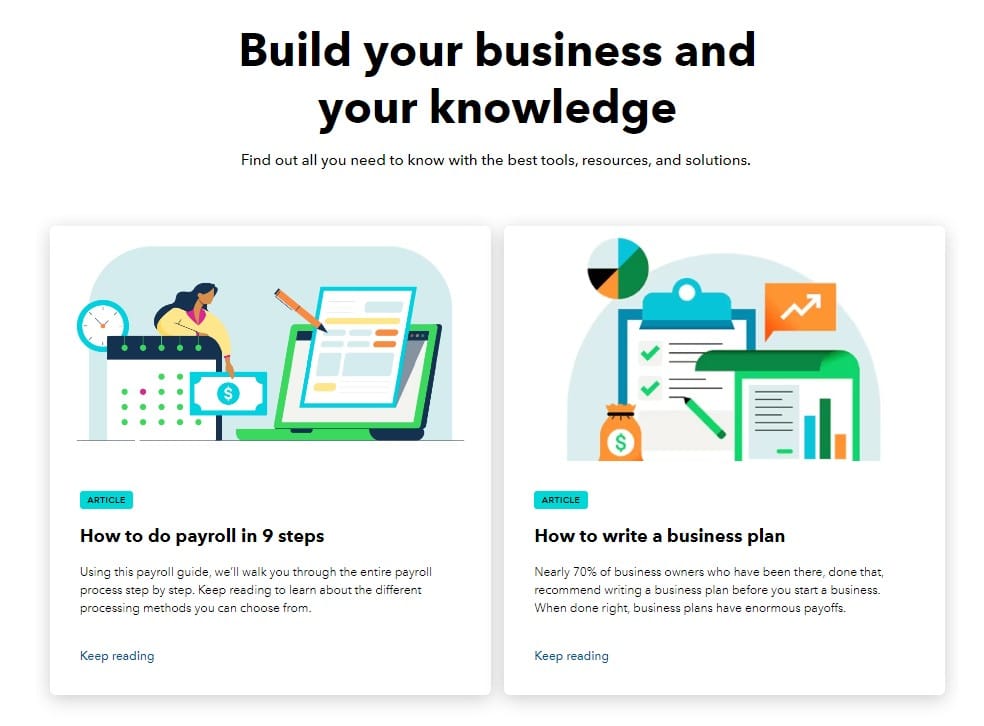
Search engine optimization (SEO) is crucial for any business looking to establish a strong online presence and drive organic traffic to their website. For large organizations, the stakes are even higher. Today, enterprise SEO is more competitive and complex than ever, especially as the industry continues to evolve and more enterprises work to maximize their online visibility.
In this guide, Senior SEO Digital Strategist Eric Solomon will explore the world of enterprise SEO management, its unique challenges, best practices, and how it can impact your business.
What You’ll Learn
- Understanding Enterprise SEO
- 6 Key Components of a Successful Enterprise SEO Strategy
- Enterprise SEO Best Practices
- Success Stories – Enterprise SEO Examples
- Common Mistakes in Enterprise SEO
- Future Trends to Watch For
- Enterprise SEO Tools to Try
- FAQs About Enterprise SEO
My Expert Insight on Enterprise SEO
Enterprise SEO is not just about optimizing web pages; it’s about creating a cohesive strategy that aligns with the overall business goals.
Enterprise SEO solutions are strategic, involving more than fine-tuning keywords or meta tags. Instead, the idea is to focus on crafting a holistic approach that incorporates SEO seamlessly into wider business objectives.
Consider the effects of Google’s recent March 2025 Core Update, which made the stakes even higher by only allowing high-quality, trustworthy, and helpful content on large websites to triumph in rankings, leading some sites to experience massive fluctuations in rankings. These changes indicate how enterprises will need to put in even more effort to succeed with an enterprise SEO strategy.

Understanding Enterprise SEO & When You Need It
Enterprise SEO is the art of optimizing large websites with hundreds to millions of pages to rank higher on search engines like Google. Unlike traditional SEO, which focuses on smaller websites, enterprise SEO requires a more complex and strategic approach to address the scale and scope of large enterprise sites.
Examples of sites that might need enterprise-level SEO include:
- Fortune 500 companies
- Large ecommerce sites with 10,000+ pages
- Businesses with multiple locations
- Enterprises with several websites
While mid-market SEO tends to involve more manual tasks and getting quicker wins, enterprise SEO entails large-scale SEO strategies that require more scalability and automation to excel.
To execute enterprise SEO successfully, a higher level of orchestration, advanced skills, and project management are required. When applied effectively, these principles can lead to significant returns for the organization.
Why Enterprise SEO?
A robust enterprise SEO strategy can drive organic traffic, improve brand visibility, and ultimately lead to higher conversions and revenue.
In recent years, enterprise SEO has grown and evolved, thanks to major advancements in technology and changes in search engine algorithms. Today, enterprise SEO is more data-driven, focusing on user experience, quality of written content, and technical optimization.
Enterprise SEO Challenges
However, enterprise SEO comes with its own set of challenges, including scalability, harmonization across departments, and managing complex websites. In traditional SEO, one or two SEOs can handle all aspects of search optimization. In enterprise SEO, the workload is too large for one or two people to manage successfully, requiring a dedicated SEO team for each aspect of search optimization.
Communication also plays a role in enterprise SEO, not only within the SEO team but across departments. The success of search optimization efforts depends on how well your development, marketing, IT, and design teams understand the value of SEO and work together toward achieving a common goal.
To ensure communication levels are where they should be, an enterprise SEO team needs to establish strict SEO guidelines. These guidelines should help colleagues and C-level managers understand the importance of SEO and explain the rationale behind certain decisions.
In addition, automation is key in enterprise SEO. Saving even a small amount of time per person can result in significant time savings for the entire enterprise.
With the help of the right enterprise SEO solutions, you could cater to the needs of every aspect of your business, creating a cohesive strategy that aligns your efforts with the goals of each department. Knowing how to do enterprise SEO the right way can ultimately help your business flourish online.
The key is implementing the most compatible enterprise SEO tools and working with experienced enterprise SEO experts who know how to develop the perfect strategy for businesses like yours.
6 Key Components of a Successful Enterprise SEO Strategy
1. In-Depth Technical SEO
Technical SEO is the backbone of any successful enterprise SEO strategy. It’s about optimizing how your website is built and how search engines crawl and understand it.
Things like site speed, fixing errors that can prevent search engines from properly exploring your site, and making sure it works well on mobile devices all play a significant role.
A good technical SEO strategy not only helps you show up better in search results but also makes it easier for people to use your site.
2. E-E-A-T Optimization
E-E-A-T (Experience, Expertise, Authoritativeness, Trustworthiness) optimization is particularly important for large organizations, especially in industries related to health, finance, and other YMYL (Your Money Your Life) topics.
Demonstrating expertise, authoritativeness, and trustworthiness in your content can significantly impact your credibility and ranking on search engines. This can be achieved by posting high-quality content that is accurate and well-researched.

3. Scale Your Content Strategy
Managing lots of content can be tough for big organizations. A good content strategy involves reviewing your content and refining your process to give users a consistent, top-notch experience.
Regularly checking your content and filling any gaps can make the user journey more unified and engaging.
4. Domain Authority and Trust
Building up your authority online is incredibly important, especially in enterprise SEO. That means getting quality backlinks, mentions from other brands, and forging partnerships to ensure your website is more trustworthy.
When your website is seen as a reliable source in your industry, it can boost your rankings on search engines and bring in more people naturally.
5. User Experience (UX) and SEO
The experience users have on your site is a big deal for SEO, especially if you’ve got a big website. Making your site fast, easy to use on mobile, and ensuring a smooth journey for visitors can make them happier and boost your rankings on search engines.
6. Data and Analytics
To succeed with your enterprise SEO, you’ve got to lean on data. By digging into things like user behavior, where your traffic is coming from, and how well your keywords are performing, you can update your approach.
Enterprise SEO Best Practices
Now that we understand the significance of enterprise SEO, let’s delve into some of the advanced strategies necessary for larger companies. In learning how to do enterprise SEO, here are some key enterprise SEO best practices to implement:
Integrating with Overall Marketing Strategy
It’s all about syncing up your SEO strategy with your broader marketing goals. Your SEO efforts should mesh seamlessly with your other marketing moves to pack a punch.
By weaving SEO into your overall marketing game plan, you can make sure your brand message is consistent across all channels. Leverage SEO insights to inform every aspect of your marketing efforts, from content creation to social media campaigns and beyond.
Integrate SEO data into your broader marketing analytics, to gain valuable insights into consumer behavior, preferences, and trends, allowing you to tailor your messaging and outreach strategies, reaching your target audience at every stage of the buyer’s journey.
SEO Governance
Think of implementing SEO governance as laying down some guardrails to uphold SEO standards across your organization. It involves providing training, guidelines, and regular check-ins to ensure everyone is following best practices and creating a culture of accountability.
Through systematic monitoring and evaluation, you can identify opportunities for optimization, refine strategies, and ultimately enhance the effectiveness of your SEO efforts in driving sustainable growth and maximizing online visibility to ensure alignment with your business goals.
Cross-Department Collaboration
Collaboration among SEO, content, IT, and other departments is crucial for a successful enterprise SEO strategy.
This collaboration also uncovers opportunities for synergy between departments, such as leveraging marketing content to enhance SEO or collaborating with IT to address technical issues impacting SEO. In doing so, encourage sharing insights, resources, and expertise so each department can contribute its unique perspectives.
Fostering a culture of collaboration ensures everyone works toward common objectives and integrates the SEO strategy seamlessly into your organization’s goals.
Enterprise SEO Success Stories
Real-world examples of successful enterprise SEO strategies can provide valuable insights into how other organizations have overcome challenges and achieved success.
Salesforce
Take Salesforce, for example. As a leading CRM platform, they manage a whopping 58,900 pages on their site, streamlining operations with a content management platform for bulk functions.
They kick-started their journey with a thorough enterprise website SEO audit, fixing technical glitches and earning relevant backlinks.
Salesforce now dominates Google’s first page for nearly 73,701 keywords, which has led to their website traffic to a staggering one million within one year.

Shopify
Then there’s Shopify, a powerhouse in ecommerce. Their SEO playbook revolves around establishing domain authority, pinpointing lucrative keywords, and crafting a robust link-building strategy.
They excel in ranking for “drop shipping” keywords and their variations, cleverly generating both external and internal links.

With a meticulous five-step SEO integration method, Shopify creates tailored landing pages for app partners, infusing them with the right mix of keywords and glowing customer reviews.
Intuit
Lastly, let’s look at Intuit, a global financial platform. Facing a content challenge, they bravely axed 2,000 outdated blog posts, making up a whopping 40% of their content. But it wasn’t a cut-and-dry decision.
By replacing the old with fresh, high-quality content, Intuit witnessed a remarkable 20% surge in overall organic traffic, soaring to a 44% spike during the tax season frenzy. This surge also resulted in a 72% increase in sign-ups.

Common Mistakes in Enterprise SEO
Discussing common pitfalls in enterprise SEO and how to avoid them can help organizations avoid costly mistakes and improve their SEO performance.
- Unclear Goals: Set clear and specific goals for your SEO strategy, whether it’s to increase traffic, generate leads, or boost sales. Divide your goals and focus on them one at a time to prevent confusion and wasted efforts.
- Skipping SEO Audits: Conduct regular SEO audits to identify areas for improvement, such as technical optimization, content quality, and user experience. Addressing these issues can boost your website’s position in search engine results.
- Ignoring Duplicate Content: Duplicate content can cause indexing issues with search engines. Use canonical tags to indicate the main version of a page and avoid duplicate content penalties.

- Neglecting Title and Meta Description: Craft unique and descriptive titles and meta descriptions for each page to attract clicks and improve search engine visibility.
- Prioritizing Over-Expansion: Focus on optimizing existing content and pages before creating new ones. Updating and optimizing older pages can improve their chances of ranking and prevent website bloat.
- Not Optimizing Channels: Use multiple channels, including SEO, paid search, and social media, to scale your marketing efforts effectively. An omnichannel strategy can help retain customers and maximize brand visibility.
Future Trends in Enterprise SEO
Looking ahead, enterprise SEO will see a ton of exciting changes driven by up-and-coming tech. Let’s explore a few:
- Augmented Reality (AR): Integrating AR into your SEO plans will open new possibilities for immersive experiences which will revolutionize how users engage with brands and search for information.
- Natural Language Processing (NLP) and Natural Language Generation (NLG): Search engine algorithms are being reshaped as their understanding of content and keywords change. These algorithms are continuing to prioritize content creation and optimization that put relevance and context first.
- Voice Search and User Experience (UX): With voice search continuing to grow in popularity, it’s essential to pay attention to the experience you’re providing users. Optimize your content for conversational queries to rank higher in search and create seamless interactions in the future.
For enterprises to thrive, staying agile and keeping up to date with these trends will be non-negotiable.
Enterprise SEO Tools & Platforms To Try
Finding the right tools for your enterprise SEO strategy can seem overwhelming, especially when you’re gearing up to serve large corporate clients. Fortunately, these tools make tasks such as keyword research, competitive analysis, website audits, and content optimization much easier.
Google Analytics
For those just starting or hesitant to invest, Google Analytics is a free tool that tracks website traffic and performance and delivers a range of audience overview and demographics reports. However, mastering Google Analytics takes time and expertise to analyze its various reports effectively. You’ll get access to customer insights to help improve your ROI, connect your insights to results, and then make your data work for you.

HubSpot’s Website Grader
This free tool evaluates your website and provides suggestions for SEO improvements. HubSpot’s Website Grader also helps enhance website performance, optimize for mobile, personalize experiences, and implement SEO best practices. You’ll get your website rating in seconds, with a breakdown of performance, SEO, mobile, security, and more.

Moz Pro
Moz Pro helps you target the right keywords to create custom support. This tool helps remove the SEO complexity by understanding your visitors, tracking your rankings, crawling and auditing your site, helping you optimize your pages, and identifying unique link-building opportunities.
With tiered plans, Moz Pro offers pricing ranging from $99/month for the most standard plan to $599/month for the premium plan. There’s an option to pay yearly to save 20% as well.

Ahrefs
Another all-in-one toolkit, Ahrefs is similar to Moz Pro and stands out for its extensive backlink database, which is helpful for link-building and competitive analysis. This tool will also help you audit and optimize your website, track your ranking progress, and give you new content ideas. Ahrefs runs its search engine, providing high-end infrastructure to power all its services.
With a free option, you’ll have access to the Site Explorer and Site Audit tools. Monthly plans begin with the Lite version, starting at $99/month, and leading up to the Enterprise custom plan, available on annual contracts only.

Other Comprehensive Enterprise SEO Software Platforms
To supplement the above enterprise SEO tools, you might want to integrate the following suites into your enterprise SEO strategy:
- BrightEdge: This enterprise SEO software suite is great for content creation and management, contributing to a comprehensive content strategy. One of the main advantages of this tool is its AI-driven suggestions to optimize content and boost website performance, and it can help refine your efforts with keyword research to help boost enterprise keyword rankings. Additional tools include backlink analysis, with enterprise-level pricing.
- Conductor: Another viable enterprise SEO solution is Conductor, which offers more unified and actionable data vs. BrightEdge’s scattered data points, with an intuitive UI that allows for seamless collaboration across teams. In addition, you get 24/7 real-time monitoring for potential issues and alerts for proactively addressing any problems before they can worsen.
- Semrush: This all-in-one enterprise SEO tool features SEO, PPC, content marketing, and social media marketing capabilities to cover all of your enterprise marketing needs. What makes this platform stand out is its comprehensive toolkit, which includes keyword research, backlink analysis, competitor analysis, enterprise SEO audits, and enterprise keyword ranking tracking. What’s most unique with this tool is its competitor gap analysis feature, which you can use to identify critical keyword and content opportunities that your competitors aren’t pursuing.
- Ahrefs: This is among the most robust keyword research and backlink analysis tools, with an in-depth backlink database and a user-friendly interface. If you want to cover every aspect of enterprise SEO, you can’t really go wrong with Ahrefs.
- Lumar (formerly Deepcrawl): For more help with technical SEO, consider using Lumar’s enterprise SEO dashboard, which can conduct an in-depth technical SEO analysis to identify any issues that might be hurting your site’s performance, with advanced analysis capabilities for large enterprise websites. Like Conductor, Lumar performs 24/7 monitoring for website changes, helping determine if there are any problems before they become SEO-breaking.

When selecting the best enterprise SEO tools, two of the most crucial components to consider are automation and AI-powered modules. AI-driven enterprise SEO metrics and data could provide you with valuable data and actionable insights, while automation can simplify various processes to help you focus more on other aspects of your business.
Pricing Models & Selecting an Enterprise SEO Service
Many enterprises can benefit from the help of an experienced enterprise SEO consultant to assist with everything from enterprise local SEO to company-wide search engine performance.
At the same time, it’s important to consider enterprise SEO pricing before you commit to any service. The right expert or agency will be transparent about pricing and what you can expect to get for your budget.
Common Enterprise SEO Pricing Structures
There are multiple pricing structures that you’ll find with enterprise SEO services, with the most common being:
- Retainer: Many enterprise SEO consultants charge a retainer fee, which is a fixed and recurring fee that you may pay monthly, quarterly, or over another period. This model is ideal for solutions that will provide you with long-term support and comprehensive ongoing services.
- Project-Based: Other service providers may charge for a single project, requiring clients to pay a fixed fee based on a set of deliverables within a particular period. You might benefit from this enterprise SEO pricing model if you need a one-time, highly specific task within a specific timeline, but it isn’t ideal for ongoing services.
- Performance-Based: Here, an enterprise SEO consultant would charge based on the results of the services you receive. For example, you might have specific goals, such as increasing rankings, website traffic, or conversion rates. In these instances, you would only pay based on how well the provider was able to achieve those goals, making the provider highly accountable.
To give you a better idea of the potential cost of SEO for enterprises, here are the average monthly SEO retainer costs based on competitiveness:

RFP/RFQ Checklist for Selecting an Enterprise SEO Expert
As you search for a service provider you can trust, the following are some critical qualities to look for that can indicate the quality of services you’ll get:
- Experience: Seek a company with plenty of experience in everything from enterprise local SEO for multi-location marketing to full-scale company-wide campaigns that cover the entire brand.
- Vertical Expertise: You may also look for experience in your specific industry—a good SEO company will have experience in many industries and be capable of expanding their services and tailoring them to work with even more.
- SLAs: Reliable service providers will also help establish clear service level agreements (SLAs) that outline the responsibilities and expectations, helping ensure services achieve the client’s goals. SLAs help determine how to resolve certain issues as they arise, measure success, and maintain a healthy, sustainable, and long-term relationship between clients and consultants.
- Transparency: You should always know what you’re going to get. Ideally, the right service provider will work with the best enterprise SEO tools to achieve results, keeping you informed with in-depth analytics and insights, ultimately using enterprise SEO best practices to help you get and stay ahead of competitors. Along the way, you should always know what approach your consultant will take and have a say in the direction of your strategy.
Enterprise SEO FAQs
1. What are the benefits of enterprise SEO?
Enterprise SEO can give you the same benefits as regular SEO, plus the ability to automate many tasks. As your website scales, your SEO team will be able to keep up.
2. How long does it take to see results from enterprise SEO?
It can take days, weeks, or months for enterprise SEO campaigns to work. It all depends on the speed and effectiveness of your strategy and when search engines crawl your site.
3. How do I know if I need enterprise SEO?
If you have a large website that’s likely to expand, you could benefit from enterprise SEO. Good enterprise SEO services can help you scale your site and maintain SEO for up to millions of pages.
Achieve Your Business Goals with Ignite Visibility
Whether you’re looking to streamline marketing processes, outshine competitors, or take your enterprise SEO game to the next level, our team at Ignite Visibility has the solutions you need.
Ignite Visibility can assist you in:
- Monitoring your online reputation and securing valuable links
- Improving your E-E-A-T optimization
- Scaling your content marketing strategy
- And much more!
Excited to get started? Contact us today to learn more about the benefits of enterprise SEO.

